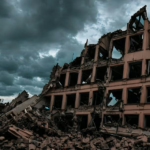
On the evening of 6 December 2023, Refaat Alareer was killed in an Israeli airstrike at the house where he was staying with his brother and sister in northern Gaza. Alareer was its target, though his siblings and four nieces and nephews were also killed in the attack. Over the preceding weeks, the 44-year-old poet, writer and professor at the Islamic University had received numerous phone and online death threats from Israeli numbers and social media accounts, including a final anonymous phone call stating that they knew he was sheltering at a United Nations school with his wife and children. This compelled him to leave. His own home had already been targeted, “surgically bombed out of the entire building” weeks before, according to a report by EuroMed Human Rights Monitor.
In a final interview with CNN, which Alareer gave permission to broadcast in the event of his death, he stated that he and his family had “nowhere else to go”. At the time of writing, his wife and five of his six children have survived him; his oldest daughter and her newborn were killed in April 2024.
A year before Israel declared war on Hamas and launched its assault on Gaza, Alareer asked in an essay, “When will this pass? When will it be enough? How many dead Palestinians are enough?” Amid a decades-long campaign against the Palestinians and 15 months of slaughter only recently halted at the time of writing by a shaky ceasefire, his question remains terrifyingly unanswerable. Alareer was one among at least 61,700 Palestinians killed in Gaza since Hamas’s attack on Israel on 7 October 2023. Many more are forecast to die from injuries, starvation and disease, with over 60,000 children in Gaza having developed acute malnutrition. Thousands of other civilians were killed before Alareer in Israel’s many wars on the Gaza Strip during his lifetime.
Alareer repeatedly accused Israel of committing genocide against the Palestinian people – a view that is consistent with the UN Genocide Convention definition and echoed by the findings of Amnesty International, the UN Special Rapporteur and numerous others, though the term remains contested by the UK government. Since South Africa launched its genocide case against Israel at the International Court of Justice in late 2023, 27 countries have either joined the case or announced their intention to support it, including Ireland. The court has made a provisional finding of “plausible” genocide. The work of Alareer and countless other Palestinian writers and scholars provides further, abundant evidence of this crime.
A professor of literature, co-founder of the writing non-profit organisation We Are Not Numbers, and editor of two anthologies from Gaza, Alareer made it his mission to share the stories of Palestinian lives with the world beyond the 360 square-kilometre strip. He earned an MA from University College London and a PhD in Malaysia and could have remained living abroad, but chose to return to his home in Gaza City. If I Must Die is a posthumous compilation of his writings, including essays, poetry and interviews, and a testament to his commitment to narrating the magnitudinous events of his own curtailed life.
The book is any number of things – a eulogy, a manifesto, a plea – but above all, it is a piece of history, a personal record of a chapter in the story of modern humanity that will be remembered among its greatest atrocities. It takes its title from Alareer’s eponymous poem, a devastatingly prescient text which went viral on social media as tributes were paid in the aftermath of his murder.
If the horrific content emerging from Gaza via social media since October 2023 were not sufficient, If I Must Die provides a detailed account of Israel’s campaign against Palestinians, one that long predates the current war. The anthology is arranged chronologically, with the works building from 2010 in an ominous crescendo to his last message, a few days before his murder, which reiterates his prior condemnations of what he saw as America’s unqualified arms funding and diplomatic support for Israel: “The Democratic Party and Biden are responsible for the Gaza genocide perpetrated by Israel,” he wrote.
As well as narrating how the calculus of death in a genocide filters down to everyday human dilemmas – whether or not to hug your child, to let them eat a second biscuit, or have the family sleep together or in separate rooms – the power of Alareer’s testimony is in how effectively he dispels the lies and political propaganda, much of it perpetrated by the west, that have sustained Israel’s criminality. In doing so, he confirms how, again and again, Palestinian voices have been systematically denied and devalued. As he notes of western media coverage, “What Palestinians say is usually doubtful: ‘according to Palestinian sources,’ ‘Palestinians say,’ ‘allegedly.’ But Israelis report facts.”
The book is also an exploration of the power of words and writings, of truth-telling, against this backdrop, including Alareer’s preference for employing English, the language of the occupier’s most powerful allies, to speak back to the world. His faith in language is not unwavering, however. As he writes on 9 October 2023 of his usual mantra to his students, “I’m lying to them if I’m telling them that [poetry] is your strongest weapon and Israel is pouring tons and tons of dynamite, of US-made missiles upon our heads.”
Despite the despair born out of the genocide and the world’s complicity therein, If I Must Die is ultimately an affirmation – of the endurance of individual and collective resistance, and of humanity, even in the darkest and most brutal of circumstances. As Alareer writes, “I think we didn’t fail. When it all comes to the end: no, we didn’t. We didn’t submit to their barbarity.”
This article is a preview from New Humanist’s spring 2025 issue. Subscribe now.


